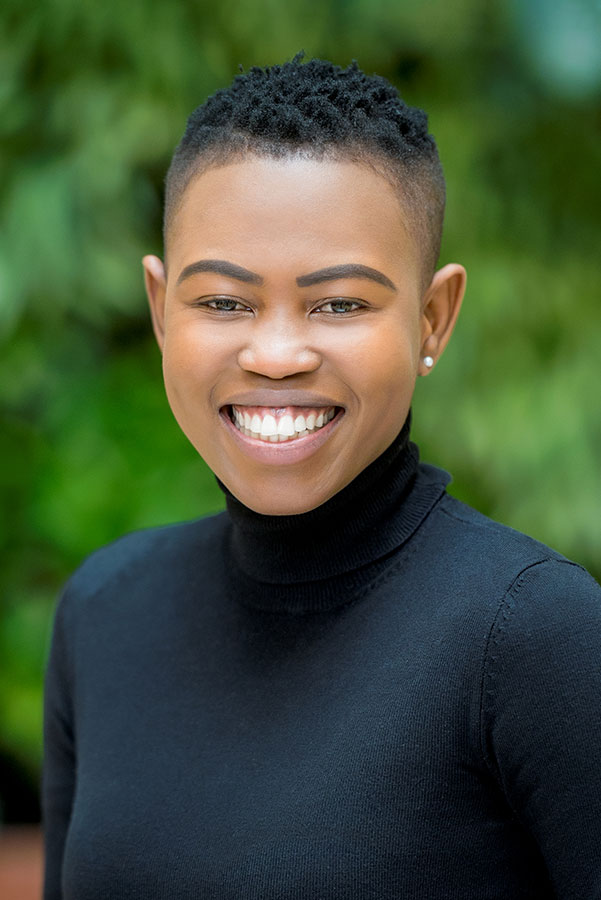“You just have to like what you do” – The PhD story of Nwabisa Florence Ndzama

Nwabisa Florence Ndzama is a third-year student at the Doctoral School of Economics, Business and Informatics at Corvinus. She is a dedicated researcher and teacher of macroeconomics.
Nwabisa became interested in economics during the last years of high school. “I was in my teens, I didn’t really know what it is exactly, but I got drawn into it” – she told us. So, she pursued her university studies in the field of economics during the bachelor’s and the master’s programmes that she completed in her country of origin, South Africa. During her studies, she has realized how broad and complex the field is. “I had to discover my passion within economics. It turned out to be macroeconomics”.
After graduating from university, she spent five years in the industry, mainly working for the South African Reserve Bank. But her growing interest in science motivated her to continue her studies. She moved to Budapest in autumn of 2020 and started her PhD studies in the Economics Doctoral Program with the support of the Stipendium Hungaricum Scholarship. “I have taken a study leave from the South African Reserve Bank to fully focus on the PhD. That’s the decision I made when I was coming here”. Nwabisa decided to dedicate four years to her main area of interest, macroeconomics.
Refining the current account balance
“My research is looking at a macroeconomic phenomenon called the current account balance” – the PhD student explained. The current account balance is a component of the Balance of Payments, which records the trade between countries, including the exchange of goods, financing and funding activities. The balance is at zero if what goes out of the country equals to what comes in. “There are cases when there is an imbalance, that is, the current account is either above zero (i.e surlus) or below zero (i.e deficit). The existing studies show that persistent and excessive current account deficits may lead to painful and prolonged economic costs. Among others, it can affect the economic growth of the country, investments, consumption, employment, the currency and can even lead financial instability”.
Nwabisa is mainly interested in the sustainability of current account deficits and develops an innovative methodology to measure it. “I think previous methodologies lack some fundamentals when it comes to the real world. I have found some gaps in them, like the behaviour of the government, the investors, and the domestic private sector could also be included. We aim to capture the uncertainty around the future values of the current account balance”. Therefore, Nwabisa proposes a new methodology that is more realistic and complex than the existing ones.
In the past two and a half years, she has received a lot of valuable feedback at international conferences. She revised her tone of writing about the issues related to previous studies and now she is working on an econometric model that can describe underlying factors, like the uncertainty that should be involved in the method. “It is a challenging exercise, but I hope to test my model in a month or so” – she told us. “I think it will be an important contribution to science when it comes to fruition”.
Knowledge sharing at Corvinus
Although Nwabisa is dedicated to research, sometimes she has difficulties and feels like she is far from reaching her goals. “There is a tendency to think that we have a lot of time after the first two years when we don’t have classes anymore”. She highlights the importance of time management throughout the whole program. She also pays attention to physical and mental wellbeing. Despite having a lot to do, going to the gym or on a hike are important for her. “I recommend finding ways to refresh your mind and body. A healthier you is a more productive you” – she said.
During challenging times, curiosity keeps her moving. “I really want to find the answers to my research questions” – she explains. “The PhD research is like a baby that you want to see grow and flourish”. Beside of her passion for research, her career goals keep her going. “Mine is to contribute to the discipline of economics through research and teaching”.
Nwabisa started teaching economics during the second year of her bachelor studies when she was tutoring fellow students. Even while she was working at the bank, she continued with teaching voluntarily. At Corvinus, she has been teaching for three semesters now and she truly enjoys it. “At the beginning of my PhD studies, I wasn’t sure about my goals but now I am certain that I would like to remain in academia”.
She feels like generally being supported by the university to reach her goals. She has opportunities to teach, attend international conferences, and consult with colleagues. “The professors at Corvinus are willing to share their knowledge. They are approachable” – she told us. She has also experienced the flexibility of the professors. “Sometimes I just knock at their door without making an appointment and they help me find the mistakes in my algorithm”.
Written by Tünde Taxner